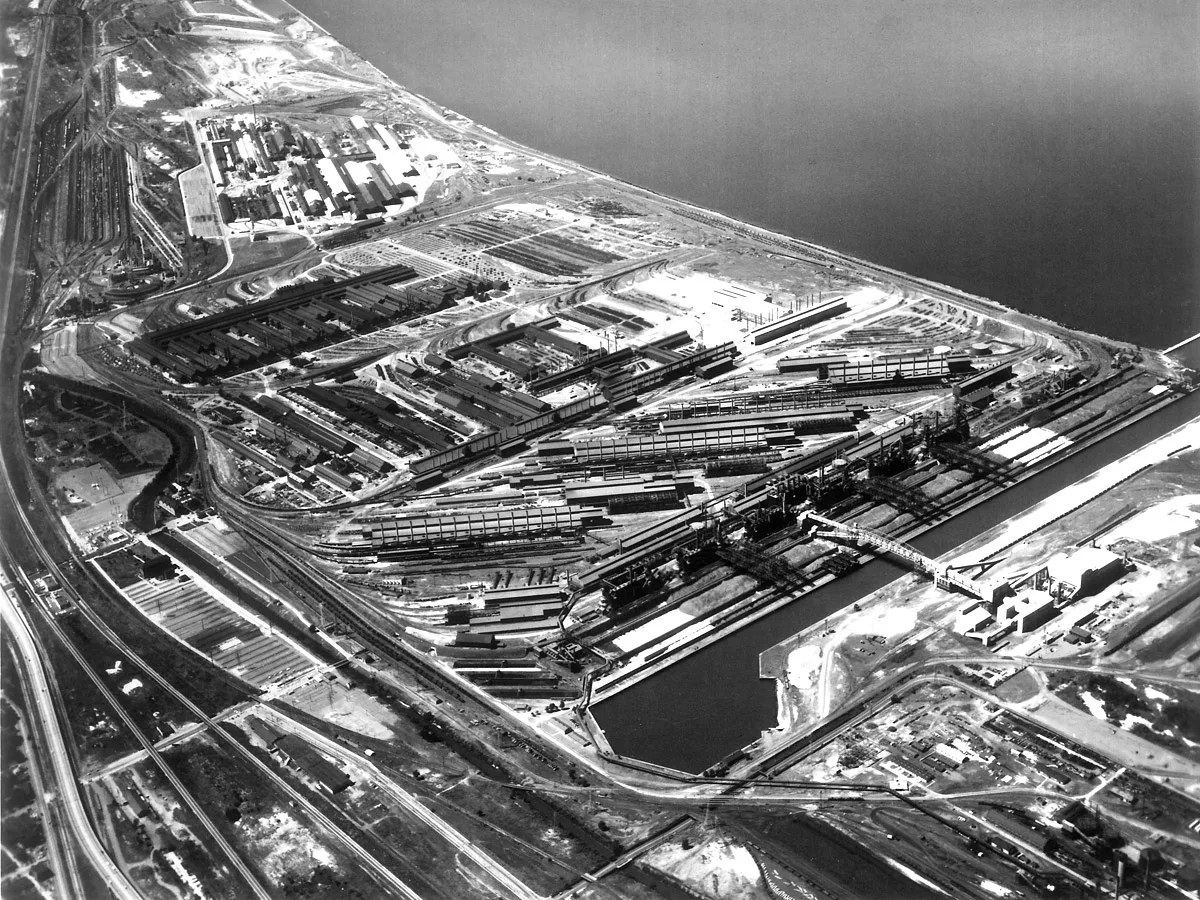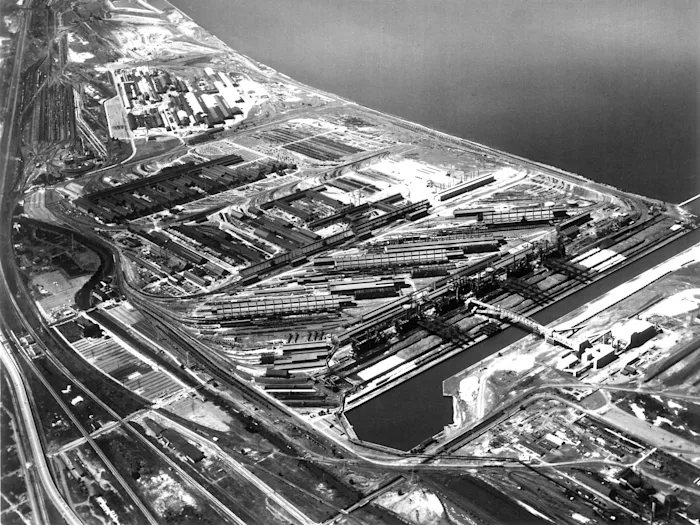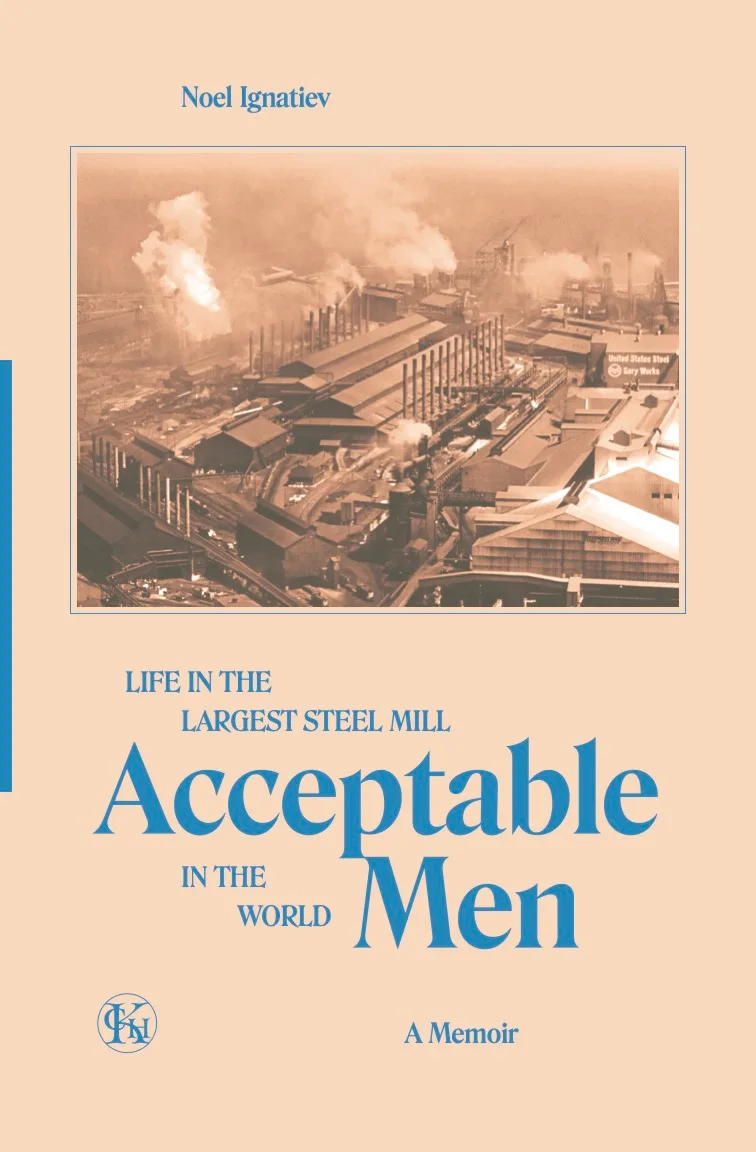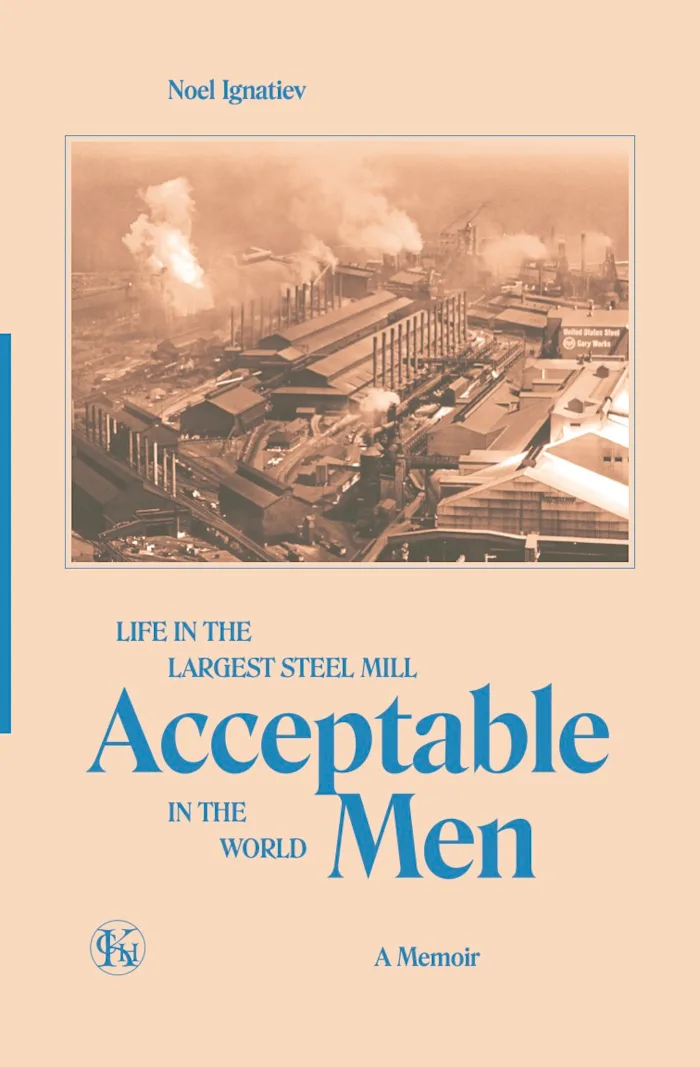“Good Kid. Don’t Say Much”
Noel Ignatiev
The following excerpt is drawn from Noel Ignatiev’s memoir, Acceptable Men, which was released this month by Charles H. Kerr Publishing Co. In it, the co-founder of Sojourner Truth Organization and Race Traitor magazine recounts the revolutionary perspective that led him to drop out of college and enter the steel mills of the Chicago area, where he would work during the 1970s and 80s. Ignatiev identifies the commitments that separated STO from the rest of the radical Left: their attention to extra-union struggles and to the refusal of work, their interest in listening to proletarians rather than preaching to them, and their unequivocal commitment to siding with black workers. Even after the collapse of that historic Left, Ignatiev’s memories serve as a vital antidote to those ideologized histories that erase both the power of autonomous proletarian activity and the tragic durability of whiteness as a real limit to working class struggles. By practicing silence and listening in the workplace, Ignatiev was able to better perceive the strategic field of class conflict that radicals in other organizations either casually passed over, or else cloaked in clichés borrowed from distant times and places.
Part of our ongoing series Desertions, which maps the manifold forms of treason, refusal, and defection from dominant images of community.
Other languages: Português
My reaction to the racist remark of the maintenance worker in the casthouse didn’t come out of the blue. By the time I began working at Gary Works I considered myself a communist revolutionary. Going to work in the mill itself was for me a political act. From the time I was a youngster I knew I wanted to dedicate my life to revolution. What drove me to it I cannot say; my brother and sister grew up in the same home I did under similar conditions and chose to follow different routes. I sometimes think of myself as the product of an accidental coming together of molecules and vectors.
My grandparents on both sides came to America shortly after 1905, four among the millions who left Eastern Europe, cast out by the mechanization of agriculture. My father’s parents, Jake and Celia, came from the Ukraine. My mother’s father, Nathan, came from “Austria,” which may have meant any place from Vienna to Galicia. My mother’s mother, Reba, had been born in the U.S. of immigrant parents but had been taken back to Russia when she was an infant and later came over on her own as a young adult. Nathan and Reba were socialists and later communists, typical of those who in the cities of the east coast were the bone, nerve, and sinew of the radical movements from the Russian Revolution until after World War II. Nathan had left school to go to work at the age of twelve. It was hard times when he came to America, but he managed to save money to bring over his sister. Sometimes he slept in doorways; he told how it was it was often necessary to put his shoes under his head at night to keep them from being stolen. During the years I knew Nathan he earned his living on a butter-and-egg route. He read the Yiddish press, mainly the Freiheit (the Communist Party newspaper), and the classics of world culture in Yiddish. The revolutionary movement was his school. His wife, Reba, died when I was five. I learned later she was a pillar of the Party apparatus.
Both of my parents were communists—my mother having been brought up in the Party, my father a bohemian radicalized by the Depression. They were largely self-educated, a testimony to the circles in which they moved. I grew up in a house full of books and classical music; dinner-table conversation was devoted to ideas.
Throughout my growing-up years, my father delivered the daily newspaper door-to-door—seven days a week for eighteen years without a day off, not even a Sunday. From the time I was eleven years old I used to get up at 4 a.m. three or four mornings a week to help him. We would work for a few hours, then have breakfast, which my father would cook. After breakfast I would catch a little sleep before going to school. The route was in a mostly-black neighborhood. My father used to say that there was not another white man in the city who could have handled it. Many of the customers would stop and tell me what a fine man my father was. I was proud to be doing a man’s job.
On Sunday we would stop at the automat, which was a treat. Twenty years later I can still taste the sausages. One of the high points of breakfast was eating with the drivers who delivered the papers in bulk. I was fascinated by their conversation. One of them said to my father, “Good kid. Don’t say much.”
I attended a public college preparatory high school for boys, the same one my father had attended. Admission was by exam. One evening in the summer after I graduated, I was walking in the center of the city when I saw a man spread-eagled against a wall, being searched by a policeman. The man was black, the policeman white. When the policeman finished patting the man down, he bade him turn around, and when the man did so, slugged him in the gut.
I ran over and yelled at the cop: “You can’t do that. You’re not supposed to hit that man.” The policeman grabbed me and threw me into a police car. I spent the night in a cell in the local station house. I was allowed to call home, and the next morning my dad showed up in court. When his case was called I tried to tell what I had seen, but before I could get out more than a few words, the judge interrupted, yelling that I had interfered with an officer. I was found guilty of something and fined twenty-five dollars. My dad paid the fine. As we were leaving the court an elderly black lady walked by and said, “God bless you.”
I have felt blessed ever since.


I began college in the fall, but left after three years to take a job in a factory. I did so for two reasons: first, I wanted to be close to the working class, which I viewed as the revolutionary class of the age. Secondly, I wanted to help the class in its struggle for communism.
The first factory where I worked employed a couple of hundred people making the lamps that were suspended over the city’s streets. My first job was as an assembler. After a few months I was upgraded to the position of drill press operator, at ten cents per hour more. There I learned my first lesson of factory life. My fellow workers taught me how to run the machine and also how to sabotage it when I needed a break. They taught me what was a reasonable amount of work to turn out so that I neither broke the rate nor let my fellow workers down.
My first goal was to fit in with my fellow workers. In order to do that I thought it wise not to let them know I had three years of college. That was easy, since no one expected a college near-graduate to be working there.
Now, ten years after leaving the university, I am working in the blast furnace division of U.S. Steel Gary Works, the largest works of the largest steel company in the U.S.
The Gary Works and the other mills in Southeast Chicago and Northwest Indiana were a natural target for radicals seeking to reach the workers. I belonged to one of the radical groups. It was one among several. Most of them were oriented toward gaining influence within the union. My own approach was distinctive. I had no interest in the union. Shortly after starting in the mill, I visited a well-known radical, who was president of the local union at a nearby mill. I asked him about the movement among steel workers.
“What movement?” he said. “There is no movement.”
I knew that in the mill where the man worked it was common for the men to finish their work in half a shift and spend the rest of the shift in the tavern across the street. I asked him about that.
“So what? They’ve been doing that for years. It doesn’t mean anything.”
I had read about the history of the struggle for a shorter work day and I thought that the men spending their time in the tavern were doing something significant, but said nothing. I remember a rainy night when a foreman came into a shanty. I was sitting with a few other maintenance workers. Some were drinking coffee, some were playing cards, some were snoozing. The foreman asked two of them to see about a certain piece of equipment that was broken.
“Can’t you see I’m busy?” said one, as he picked up the cards for the next deal.
“We’ll get it when the rain stops,” said another.
The foreman left, apparently satisfied that he had got the most he could from them at that moment.
In the midst of all this I had attended a national conference put on by another radical group. A couple of hundred people were present, nearly all ex-students; they all stood and introduced themselves by name and the number of the union local to which they belonged. When my turn came I stood and gave my name and the name of the mill I worked at, omitting any reference to the union.
The group I belonged to was a branch of an organization centered in Chicago forty miles away. The group called itself Sojourner Truth Organization (STO), named after a woman who had escaped from slavery in 1826 to become a famous abolitionist and women’s rights activist. Our group in Gary consisted of a dozen people, mainly ex-students like me, who had committed ourselves to doing political work in the mill town. Some of us worked in the mill, a few in a local hospital. One worked for the welfare department, and one was a housewife. I fully expected that within two years we would either be “running the city or run out of town.” We published a newsletter, The Calumet Insurgent Worker, reporting on things that were happening in the area and around the world, and distributed it widely in the mill. Jackson said it was the best of the little radical papers that occasionally found their way inside. It differed from the others in two respects: first, rather than preaching at workers, it was a place where their voices could be heard. For example, the second issue ran a letter from a mason who worked at one of the mills in which he lamented the lack of support from other workers when the masons went on strike for 117 days. The next issue carried a response from another worker who asked why the masons had their own union. “It is true,” wrote the correspondent, “that the steelworkers’ union isn’t worth a damn, but still it isn’t right for one small craft to cut themselves off.” He wondered how many blacks and Puerto Ricans are in the masons’ union; he never saw any on the picket line. The second difference with the usual radical papers was that The Calumet Insurgent Worker sided unequivocally with the black workers, even at the risk of offending whites.
I was especially proud of an article I didn’t write but merely “found.” U.S. Steel Gary Works published a newsletter aimed at the employees, written in a cheery style. One of the articles in it told the tale of a woman whose husband and children had worked at the mill over decades, sometimes as many as six at once. She recounted her life of packing lunches and dinners and washing work clothes, and concluded, “I, too, feel as if I had worked for U.S. Steel.” I was certain the editor of the company newsletter was aware of the irony. The Calumet Insurgent Worker reprinted the article without comment.
When workers at the nearby auto plant went on a wildcat strike, I drew up a leaflet calling upon workers at the mill to show up at their picket to support them. STO distributed it at the mill gates. So far as I could tell, there was no response.
When a couple of autoworkers at a Chrysler factory in Detroit took over the power station and shut the place down, I went to Detroit to get in touch with them and invite them to Gary to speak. Our STO branch set up a meeting for them at a local church and arranged for flyers to be passed out at the mill announcing the meeting. Only the organizers attended.
We held a meeting at the same church for Mississippi pulp workers, black and white, who had organized an independent union and gone on strike and were on tour to build support. That one was better attended—maybe a half- dozen people apart from the organizers. The Calumet Insurgent Worker printed a letter from a black steelworker who attended the meeting:
Their story was interesting, but several things about their presentation bothered me. Their leader mentioned several times that the black woodcutters had been slow to join in the strike and that they had furnished some of the worst scabs. I think if he was going to tell these things then he should tell why. It wouldn’t hurt anyone’s feelings to hear the truth. I blame myself for not asking him during the question period. I guess the reason I didn’t was because I already knew the answer: the black people in Mississippi have been betrayed so many times by whites that they are not going to rush into an organization that was started by whites even if it looks like it is to their advantage. I also didn’t like the way the white leader of the group jumped in and answered all the questions from the audience. I could understand the two women being shy, but I talked to the black man afterwards and he seemed able to speak for himself. The group seems to have learned the need for working together, and that is good. But there is still a long way to go.
Around that time, owner-operator long-distance truckers went on a shutdown protesting high fuel prices. All over the country, they pulled their rigs into truck stops, turning them into centers of organization. Because in many cases they chose to pull in close to where they lived, their wives and girlfriends began showing up. The Gary Works was close to the intersection of two major interstate highways, and the truck stop at the intersection became one of the centers. STO members moved temporarily to the truck stop to work directly with the strikers. One of our first actions was to help the truckers design a poster, showing a photo of an actual striker’s truck at the truck stop, with a sign in the driver’s window that read “Shut down until...” We printed the poster on STO’s press, and distributed it widely at the stop and in the Chicago area.
In addition to printing the poster and talking with the wives and girlfriends of the truckers, STO members helped the truckers make contact with women living in the area whose husbands, brothers, or sons had shut down in other parts of the country. We hoped to persuade the strikers to broaden their demands to address not merely fuel but food prices. We also sought to build links between the strikers, largely white men, and people of Gary, whose population was largely black, by pointing out that we all shared an interest in keeping prices down.
I recall a meeting at a member’s home, at which a black trucker reported that one of the whites, seeking to protect his rig and not recognizing him as a fellow driver, had leveled a shotgun at him when he was walking through the truck stop. I thought the presence of a black trucker at that meeting was a major achievement.
For a short time the work stoppage had a national impact, forcing the government to call out the National Guard in some areas. STO was perhaps the only radical group in the country to take the stoppage seriously. In part our support was due to the fact that it reflected our vision of mass organization independent of the unions. As owner-operators the truckers were formally self-employed independent contractors who could not have formed a traditional union even had they desired to do so. But also we were attracted to this struggle because of its reliance on direct action rather than negotiation.
In the end, the strike petered out, as the truck stops emptied and the truckers returned to the road. I thought the experience proved that a small group could have a big impact, and speculated that if a group like STO had existed nationwide, the outcome could have been different.


Excerpted with permission from Noel Ignatiev, Acceptable Men. Life in the Largest Steel Mill in the World. Available now from Charles H. Kerr.